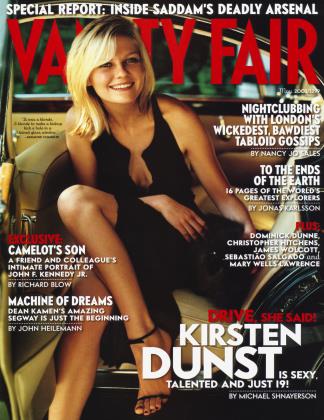Sign In to Your Account
Subscribers have complete access to the archive.
Sign In Not a Subscriber?Join NowQ & A
VANITIES
GEORGE WAYNE
Dick Clark’s dance to the music of time
Being the world’s oldest teenager doesn’t mean you can’t also be one shrewd businessman, and Dick Clark’s eponymous production company is responsible for some of the most profitable award shows and specials on television. On the eve of American Bandstand’s gala 50thanniversary prime-time special, the man who has been a fixture in American living rooms since we liked Ike tells our correspondent about the twist, being type A, and the birth of the Beatles. ⅝
George Wayne:It’s hard to imagine that Dick Clark was once a weatherman.
Dick Clark: That was David Letterman.
G.W.I thought you were one in Utica.
D.C. Oh, I know what you’re talking about—I gave the weather forecast on the radio as part of my duties.
G.W.Did you conceive the concept for American Bandstand?
D.C. The show was conceived in 1952 almost by accident by two other men. They were playing musical films, but the kids in the studio got bored watching the films so they got up and danced. The director took shots of them dancing, and within days they gave up the films and decided to play records and have kids dance. It became a phenomenon that was copied all over the world.
G.W.The rap on American Bandstand is that you took too long to integrate the show.
D.C. We went on in 1952, but the audience wasn’t integrated until 1958, and I think that’s pretty early. In those days, George, there was no integration to speak of at all.
G.W.So you disagree with the critics? D.C. I think that’s wrong, and anyone who looks at the history will see that we were a pioneer.
G.W.What about the fact that you missed the coming of the Beatles?
D.C. Some old partners of mine did have the rights to their first record in the States, “She Loves You.” As a favor, we played it on the radio, and it failed.... G.W.You certainly didn’t miss Prince or Madonna or Donna Summer.
D.C. They all made their debuts on American Bandstand.
G.W.And that famous moment when you said to Madonna, "What do you want to do in the future?” And she said, "I want to rule the world.” What was it like the first time you met her—was she, like, chewing gum and spraying you with her saliva?
D.C. It was interesting to watch the audience reaction, because she knew she was special.
People ask, did I know? In this case I saw it happen before my eyes, and I knew she was going to be big.
G.W.Would you consider yourself a type-A personality?
D.C. Of course. It was obvious since I was a child.
G.W.You’re worth about what$300 million?
D.C. I have no idea. I never talk about such things. It’s a cliche, but health is the only thing that counts.
G.W.What about this lawsuit? You’re suing Grammy president Michael Greene for barring talent from appearing on your American Music Awards. This smacks of a publicity stunt.
D.C. No, you’re mouthing the same words that Mr. Greene mouthed. If I wanted publicity, I would have sued him three or four days before the air date of the awards, which I produce, instead of a month before. This is 100 percent serious. There is an internal investigation going on at the National Academy of Recording Arts & Sciences right now, so it will be very interesting to see the outcome of that.
G.W.One would think that somebody of the caliber of a Michael Jackson or a Britney Spears would have the power to say, "I’ll appear on whichever show I wish.”
D.C. It’s a standing policy with the Grammys, but Mr. Greene made one misstep. He stepped over the line when he broke a business arrangement between Michael and myself, and that’s against the law.
G.W.And what was that?
D.C. You can’t interfere with someone else’s business; you can’t cause someone to break that agreement without breaking the law.... I have no ulterior motive here other than to throw light on a very dark corner of the music business. It should be investigated to see whether the academy wants to endorse
Mr. Greene’s policies.
G.W.The only scandal in the life of Dick Clark was his involvement in payola.
D.C. That’s ancient history, George—let’s move on.
G.W.What’s your favorite dance craze to emerge from American Bandstand?
D.C. The biggest dance craze was the twist. G.W.More than break dancing?
D.C. Yes, the twist was universal, and it was the first time that adults ever freely and openly admitted that they liked rock ’n’ roll music.
 View Full Issue
View Full Issue


















Subscribers have complete access to the archive.
Sign In Not a Subscriber?Join Now